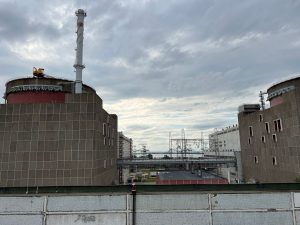After several days of heightened concern about a possible Russian attack on Ukraine’s Zaporizhzhia nuclear power plant (ZNPP) in late June and early July, such a provocative action appears increasingly unlikely. Ukraine’s military intelligence chief, Major General Kyrylo Budanov, said on July 6 that the threat is “subsiding.”
In fact, an intentional attack on the plant is highly unlikely to ever materialize. While Moscow does not hesitate to implicitly threaten Ukraine and other Western states with nuclear weapons, it is highly cognizant of the risks of even a single nuclear incident, and it is not incentivized to strike the Zaporizhzhia nuclear power plant. The destruction of the ZNPP would do little damage to Ukrainian military forces; world public opinion, including even in China (and possibly within Russia), would likely react swiftly and extremely negatively to an attack; the Western and NATO response would be strong; an incident would permanently reduce Russia’s role in nuclear energy supply chains; and the order to attack the facility might be disobeyed by Putin’s own forces.
While Vladimir Putin has a long history of issuing nuclear threats against the West, including in the early days of the invasion of Ukraine, the overwhelming body of evidence suggests he is a rational actor and can be deterred. Even though he miscalculated – badly – in his initial invasion plans, his current strategy of outlasting the West and undermining Ukraine insidiously, via Western elections, is highly rational, could very well succeed, and may even improve Moscow’s position relative to the status quo ante.
Although Putin is an utterly amoral figure, there is little reason to think that he believes an act of nuclear terrorism will advance his interests. It’s difficult to identify any military benefits of an attack. Even in a worst case scenario, an act of nuclear terrorism against the Zaporizhzhia nuclear power plant would have almost no impact on surrounding areas, according to nuclear energy experts, as the reactors have been shut down for over 10 months and are no longer producing heat.
Moreover, the political costs of an attack would be extremely high. An attack on the ZNPP would cross the nuclear threshold, necessitate a strong Western response, and damage Moscow’s ties with Beijing and New Delhi, perhaps severely.
Beijing has already expressed its opposition to any attack on the ZNPP. On June 26, at the first press conference after the Prigozhin mutiny, China’s Ministry of Foreign Affairs notably called on a Ukrainian journalist, who raised concerns about the ZNPP. The spokesperson pointedly replied that “China takes the safety and security of Ukraine’s nuclear facilities seriously and supports the IAEA in playing a constructive role in this respect.”
The spokesperson was echoing comments reportedly made previously by Communist Party General Secretary Xi Jinping to Vladimir Putin. According to reporting from early June that cited both Western and Chinese officials, Xi personally warned Putin about using nuclear weapons in Ukraine.
Putin knows Beijing’s “pro-Russia neutrality” does not imply unlimited support for Moscow. He also understands that an act of Russian nuclear terrorism against the ZNPP would trigger a response not only from the West, but probably also from Beijing.
The totality of Beijing’s political and economic response to an incident of Russian nuclear terrorism would be unpredictable, but a reduction in nuclear energy cooperation with Moscow would almost certainly result.
In the face of an attack on ZNPP, China would likely suspend its cooperation with Russia on nuclear energy trade over time. Given Russia’s importance to nuclear energy supply chains, cutting it out of nuclear energy supply chains would take years, not months.
While Beijing and the West would struggle in the near term to replace Russia’s role in nuclear energy supply chains, particularly in the areas of uranium conversion and enrichment, Moscow does not control upstream production of uranium mining. With 43 percent of world uranium mining concentrated in Kazakhstan, a nuclear attack on the ZNPP might lead Beijing and the West to deepen ties with Kazakhstan and other countries vital to the nuclear energy supply chain.
An attack on the ZNPP would do more than degrade Sino-Russian nuclear energy cooperation, of course. Beijing would come under unprecedented domestic and Western pressure to restrict political and economic ties with Moscow in the wake of an act of nuclear terrorism.
While the international consequences of an attack on the ZNPP likely preclude Putin from seriously considering the measure, potential domestic opposition may weigh even more heavily on his thinking. If Putin orders an attack on a nuclear facility, he could very well face defiance from Russian armed forces unwilling to cross the nuclear threshold. Military disobedience of a direct order would severely undermine Putin’s authority, which has already been eroded by the recent Prigozhin mutiny, and perhaps even lead to his removal.
While an attack on Zaporizhzhia can’t be ruled out, an act of nuclear terrorism appears highly unlikely given Putin’s cost/benefit calculus.

































